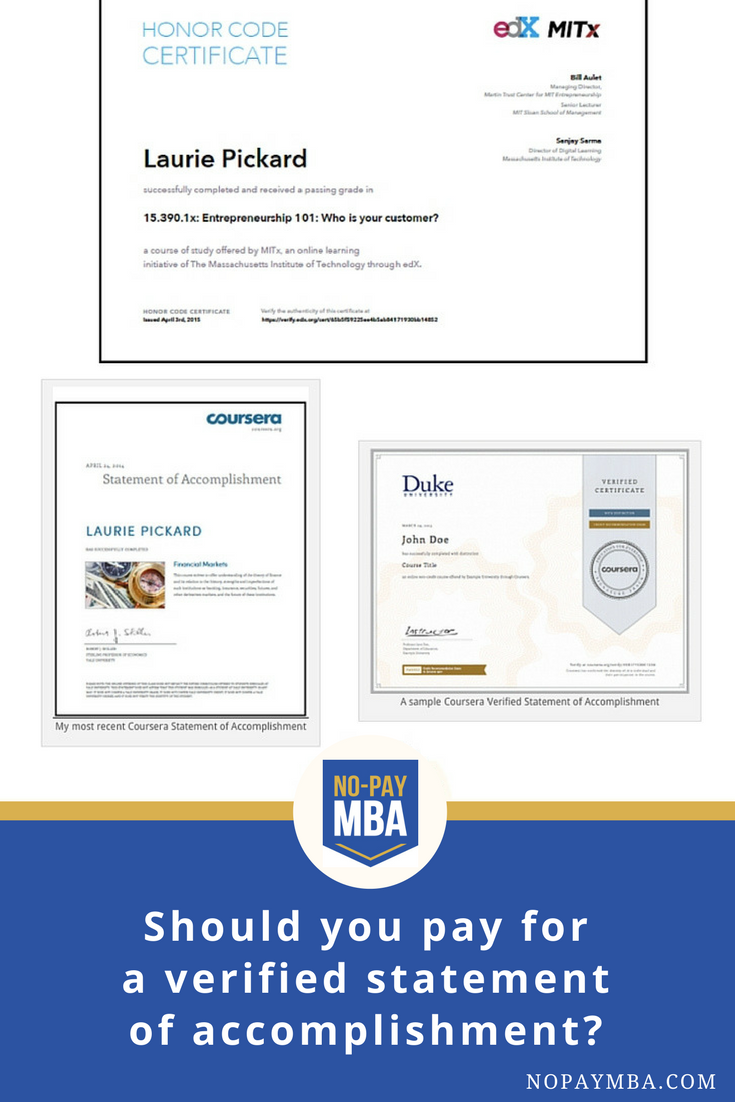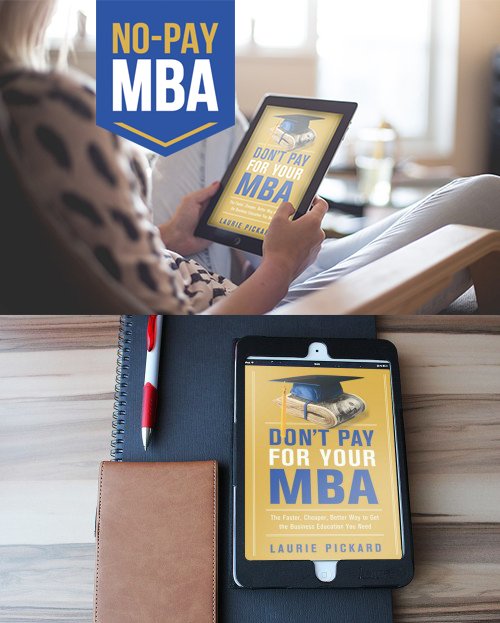Should you pay for a verified statement of accomplishment?
This post has been updated for 2015! See the new post here:
https://www.nopaymba.com/pay-verified-statement-accomplishment-mooc-update/

I’m currently taking three courses – two from Coursera and one from edX. All three come with a final course certificate, and all three offer an upgrade option for that certificate. In my two Coursera courses, the “Signature Track” option comes with a “Verified Statement of Accomplishment;” in my edX course, I can choose to enroll as an “ID-verified” student to get a “Verified Certificate of Achievement.”
So far, I haven’t spent any money on course certificates. Frankly, I wasn’t convinced the first time Coursera asked me to join a course’s Signature Track, and I still don’t see the added value.
What exactly is a verified course certificate?
Both Coursera and edX offer essentially the same product. For a fee ($49 on Coursera, $25 on edX), you can verify your identity by submitting a typing sample and snapping your image on a webcam. On subsequent logins, the system makes sure that you are the same student as before. At the end of the course you get a slightly snazzier-looking certificate than you otherwise would, with the word “verified” on it.
The value proposition for this product is based on four assumptions:
1. Course certificates have value to students.
2. Students will cheat to get these certificates, so there is value in ensuring that the person who holds the certificate is the same person who completed the course work.
3. Webcam photos and typing samples are an effective way of verifying a person’s identity.
4. Employers (or other third parties) know the difference between verified and non-verified course certificates.
Why I haven’t bought any course certificates
First, I’m skeptical that course certificates themselves are valuable. I can hardly imagine that I’ll present my course certificates to future employers for the same reason that I don’t list my individual courses from undergrad on my resume. The totality of the program of study is much more important than any individual class. That said, some type of proof of course completion is probably worth something, especially if you can aggregate individual certificates into something bigger.
If certification is valuable, then it does follow that some students will cheat to get them. However, I’m not at all convinced that verifying that the same student logs in again and again is a good way to prevent cheating. For example, a student who wants to cheat could get answers from a person sitting next to him or her, while still meeting the typing and webcam tests. It would even be possible for one person to do all the work for a course under someone else’s name.
But let’s leave that to one side. Let’s assume that the verification process is a good way of providing proof that person X really did the work for a given course. Even then, and even if employers care about course certificates at all, I highly doubt that they know the difference between verified and non-verified certificates.
Let’s say that employers do care. What the verified option currently tells you is that the person in question was able to complete a course without cheating. That might mean a lot if you knew that the course was really tough, or if mastering the material was essential for some particular purpose. But for any old course, if I was able to sit through a few videos, answer a couple of quiz questions, and post ungraded comments on a discussion forum, do you as an employer really care that I was able to do that without having to cheat? I’m not buying it.
A course certificate I would pay for
If MOOC providers want to make money from course certificates they could do a few things.
1. Don’t give away any course certificates for free. The marginal difference between having a certificate and having no certificate is greater than the marginal difference between a regular certificate and an identity-verified certificate. There are probably more people willing to pay for any kind of certificate at all when certificates aren’t free than there are people who will pay for a premium certificate when regular certificates are free.
2. Include course difficulty or relevance ratings on the course certificate. Anyone who has taken a few MOOCs knows that the level of difficulty varies enormously from course to course. Likewise, coursework varies from immensely practical to merely interesting. Students know the difference. It would be easy enough to crowd source difficulty and relevance ratings to give a better indication of how valuable a given course certificate is.
3. Focus on strings of courses that demonstrate professional competency. Completion of a series of courses has a much greater potential to signal mastery than a single course completion certificate. edX has started to group courses in its xSeries. Coursera has begun to do the same with its Specializations. The models here are slightly different. edX charges for the courses themselves at about $100 per course, while Coursera charges only for the verified Statements of Accomplishment. I am excited to take a set of business courses from one of these providers, but so far none have been released. (I’m still waiting on MIT’s Supply Chain Management series through edX.)
4. Market aggressively to teach employers the value of course certificates. A certificate I would be happy to pay for would be one that employers find interesting or impressive. Even more valuable would be a certificate that signals to an employer, “If this person was able to finish this series of courses, then she must be capable of doing work in ______________________________ (insert field).”
I’d like to hear what others think about this. Do you pay for course certificates? If so, why? If not, why not?





